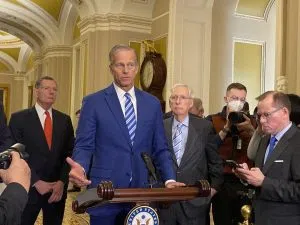
Sen. John Thune, Republican of South Dakota, speaks during a press conference inside the U.S. Capitol on March 20, 2024. Thune, a Republican, officially became majority leader Friday. (Photo by Jennifer Shutt/States Newsroom via the North Dakota Monitor)
(Ashley Murray – North Dakota Monitor) – Republicans took control of the U.S. Senate Friday under the new leadership of South Dakota’s John Thune, who promised to keep intact the body’s legislative filibuster — the 60-vote threshold for major legislation that some Democrats had targeted for elimination.
Thune follows in the footsteps of the longest-serving Senate GOP leader, Mitch McConnell of Kentucky, and takes the reins as Republicans prepare to control the Senate, House and White House once President-elect Donald Trump takes office on Jan. 20.
In his first opening remarks as leader, Thune said he would restore the upper chamber as “a place of discussion and deliberation” as the body pursues an aggressive agenda to overhaul immigration and extend 2017 tax cuts — not to mention actually funding the government, albeit months late, once temporary measures expire in March.
Republicans are eying the budget reconciliation process — a legislative maneuver that allows the Senate to avoid the 60-vote filibuster — to achieve as many of the party’s political goals as can be justified in the one-per-fiscal-year budget resolution. Democrats used reconciliation twice during their unified government in the 117th Congress.
Still, Thune hammered in his opening remarks at the start of the 119th Congress that the Senate must remain the “more stable, more thoughtful, more deliberative” body.
“Unfortunately, today there are a lot of people who would like to see the Senate turn into a copy of the House of Representatives,” Thune said on the floor.
“And that,” he continued, “is not what our founders intended or what our country needs. One of my priorities as leader will be to ensure that the Senate stays the Senate. That means preserving the legislative filibuster.”
Thune described the 60-vote rule as having the “greatest impact on preserving the founders’ vision of the United States Senate.”









